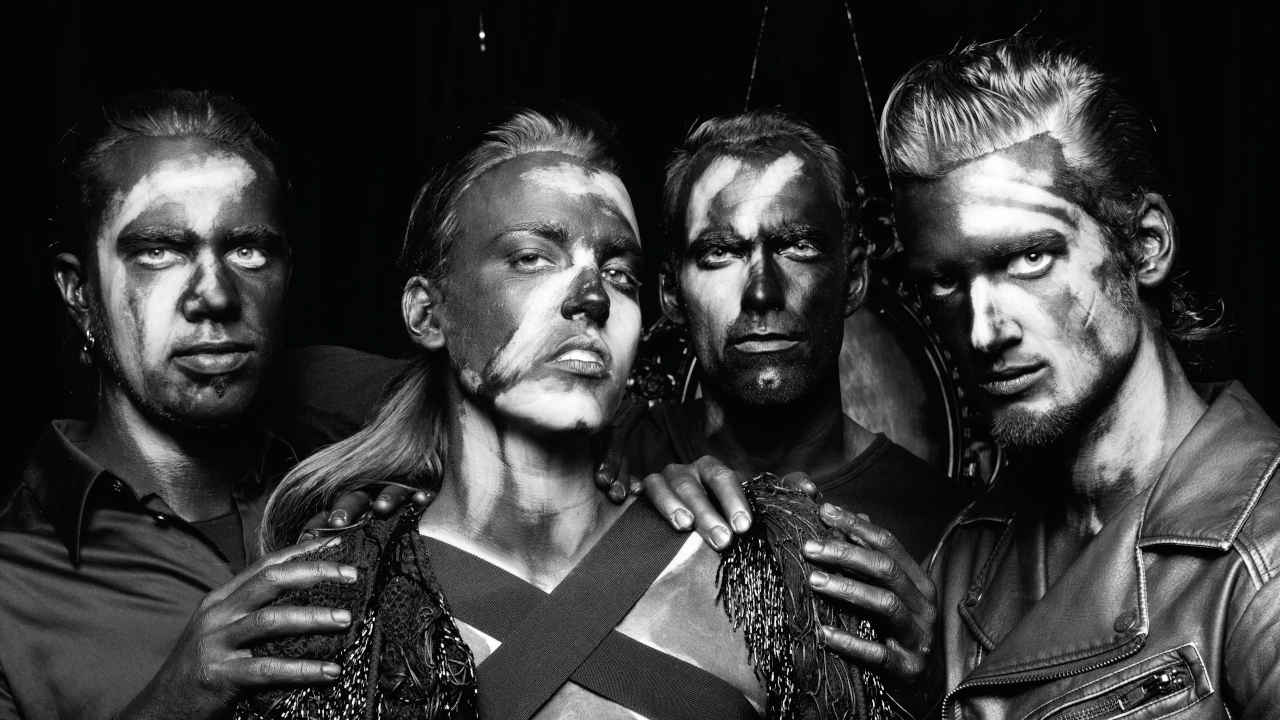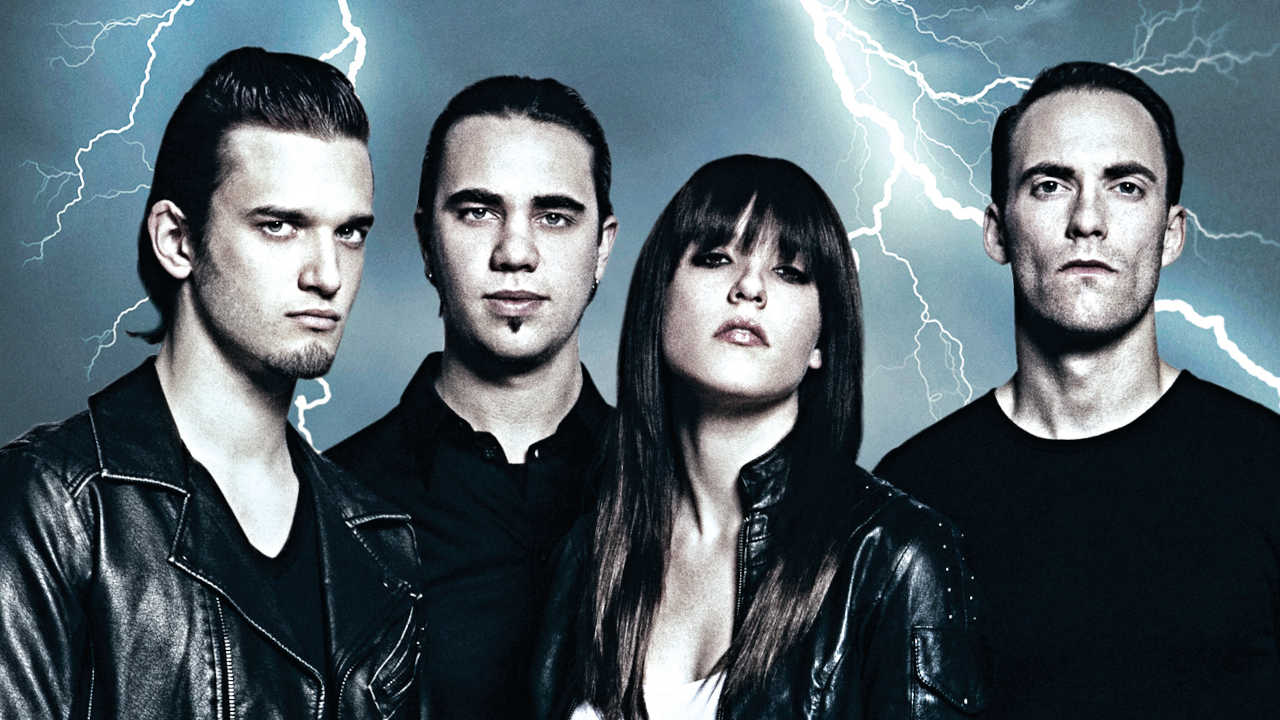In 2011, Halestorm were still young guns on the scene. Two years prior, the Pennsylvanian rockers had emerged from playing local malls, marking themselves out as an exciting new noise with their self-titled debut. But it was their second album, 2012’s snarling The Strange Case Of… that would prove to be their turning point.
The record that introduced the masses to their bombastic hard rock, it contained their most career-defining songs, the sound of a band running wild and free, coming into their own and testing their own limits. The quartet would start the album’s cycle as hungry upstarts and emerge as Grammy-winning, festival field-filling ass kickers.
“With that whole record, I feel like we crossed over into not proving that we deserve to be here, but proving that we deserve to stay here,” remembers vocalist and guitarist Lzzy Hale. “As time goes on, you know more about the inner workings of everything, and it becomes a little less magical. Whereas that was our purgatory: it was the second record, everything was still super-new.”
She describes the album’s recording sessions that took place at multiple studios in Los Angeles and during which the band moved into a house in the coastal community of Marina del Rey as a sort of summer camp.
“I never went to college, and my replacement for that was this second record,” she continues. “We would meet complete strangers, become best friends and go over and stay at their house until 4am. The four of us are close anyway, but this was like a household. The parents aren’t around so it’s the four of us like, ‘OK, who’s going out to get groceries today? Do we have enough beer?’ Priorities!”
Initially, the album’s breakout song was thunderous first single Love Bites (So Do I), which, to the band’s amazement, beat out Iron Maiden, Lamb Of God and Megadeth to bag the Grammy for Best Hard Rock/Metal Performance in 2013 – their shock evident as they stumbled down to the podium, reading an acceptance speech hurriedly typed out on drummer Arejay Hale’s phone. Over time though, another track has firmly supplanted it as the record’s defining moment.

The larynx-shattering I Miss The Misery had been one of the tracks they’d started testing live before the album was released, and on seeing how the crowd reacted to its incendiary chorus, they decided to release it as its second single.
Ten years on, it’s become their most enduring song, a fan favourite that currently stands at 86 million views on YouTube, dwarfing the 28 million views of its award-winning predecessor. Belting out of the blocks with a banshee scream from Lzzy: ‘OOOOOOH! I miss the misery!’ the track immediately put the band’s greatest asset – her gale-force vocals – upfront.
“It was such a whim to start it that way. Originally we were going to start it with the riff and then we said, ‘Let’s do it in a different way, let’s start with the voice,’” she recalls. “And now 10 years later, that’s kind of become my thing.”
The song is the kind of balls-to-the-wall sonic assault we now expect from Halestorm: mountainous riffs, a huge chorus and raspy, life-affirming vocals all reflecting an escalating confidence that ripples throughout the album at large, but it’s Lzzy’s growing assurance as a vocalist that shines through. Certainly, it impressed bands like Black Stone Cherry and Shinedown, who asked her to lend her pipes on the duets Peace Is Free and Breaking Inside around that time.
“I was definitely pushing vocally, versus the first album,” says Lzzy, who says she “came into her own as a vocalist” during The Strange Case Of… recording sessions. “We’d been touring a lot, we were doing 11 days in a row at one point, so I really got to know where my limitations were and where they weren’t.”
It was producer Howard Benson (Motörhead, Sepultura, My Chemical Romance) who challenged her to go one step further with each vocal take.
“He’d say, ‘Nope, I think you can sing higher than that,’” she laughs. “That was a huge confidence builder for me with my vocals because I started to not only expand my range, but find that control and that attitude that goes with it. It really laid the ground for literally everything I do vocally now.”
I Miss The Misery was also the moment Lzzy established herself as a true force of a nature, a figurehead whose confessional, resilient lyrics would be adopted by fans as emotional armour. It was written during a period of turmoil for the Hales – while the band partied and recorded in LA, back home in Pennsylvania, Lzzy and Arejay’s parents were in the midst of a divorce.
“I remember having a conversation with my mom about my dad,” says Lzzy. “They had been together for so long, the basis for [the] relationship is the arguments and the fights and the disagreements. That turned into, I don’t miss you, I actually miss the misery. I thought that was hilarious. I think it was my way of turning something that was negative into something positive.”
For Lzzy, the song also had a deeper, personal meaning, chronicling her break from a past toxic relationship.
“A guy cheated on me a couple of times and I swore I’d never go back,” she recalls. “There was that pull to go back and I never did, but I remember that feeling. It’s almost like you’re being a masochist in some way, it’s comfortable to live in those feelings.”
She considers I Miss The Misery to be her first anthem of empowerment, something that has since become her calling card. “I discovered I have this ability to write a song about how something sucks and try to maintain that hope or that attitude and control.”
One particular lyric, which was intended to force people outside their comfort zone, really ruffled feathers at the time: ‘I miss the rough sex / Leaves me a mess.’
“2012 wasn’t that long ago but it was in terms of women and evolution,” she says, noting that just 10 years ago a woman owning her desire and sexuality was considered “taboo”. “That almost made me want to double down on that kind of stuff too. By the time we made our fourth album, I’m talking about ‘do not disturb’ and threesomes and really getting people red in the face but to me, it’s fun.”
Building an open and frank relationship with the fans has been incredibly rewarding for Lzzy.
“I’ve had parents tell me that they hope their girls are as sexually confident as I am when they grow up,” she reveals. “That wasn’t something I expected. I expected to get angry parent letters – it’s been the opposite.”
Ten years after the song’s initial release, following #metoo and in light of increasingly transparent conversations around abuse in the music industry, she recognises that the meaning of the song has evolved for some fans.
“It’s really beautiful how people can take this song with me being a little tongue in cheek, and actually find that deeper meaning in it. Somewhere where I wasn’t even looking,” she says. “I know that song has helped so many people get over so many of those types of relationships, move on and find some type of superpower within themselves to walk away. In a lot of abusive relationships, the hardest thing is to break away from it. That song has helped break that stigma a little bit, or at least helped someone say, ‘This is the final straw and it’s OK if I miss it, but I’m not going back.’”
The Strange Case Of… was released on April 10, 2012 and changed the band’s lives. Armed with an arsenal of new anthems that were resonating with the fans, Halestorm headed into the 2012 summer festival season and found themselves being bumped higher and higher up the bills. But more importantly, the album would secure the band an identity and longevity they’ve built on ever since. And while Love Bites (So Do I) won the Grammy, and the album’s third single, Freak Like Me, released in January 2013, was the band’s first single to reach No.1 on Billboard’s Mainstream Rock Chart, I Miss The Misery has proven to be the track with the most staying power.
“I feel like the people have spoken and so it’s almost more rewarding for us than Love Bites and the Grammy,” considers Lzzy. “If you had told me, even in 2012, that I’d be standing onstage today encouraging young people to own their weird, to empower young women… that song was the groundwork for us being able to say that is what we do, and that is what people see when they look at me. It’s such a beautiful thing.”

